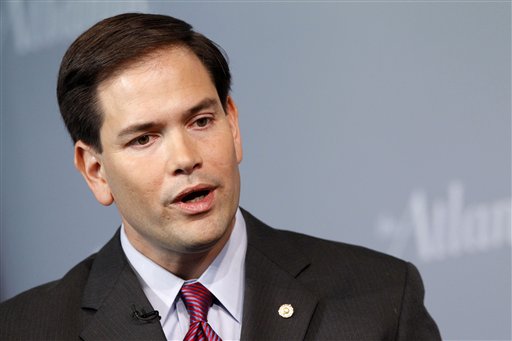A day before President Barack Obama is due to reveal his own immigration proposals in a speech in Las Vegas, NV, a bipartisan group of eight senators has announced a deal on the “outlines” of an immigration reform deal, according to Politico. The “Gang of Eight,” which includes Florida Sen. Marco Rubio, who has led the push from the Republican side, had been at work for weeks and unveiled its compromise on Capitol Hill today.
The deal includes several measures to improve border security, a core Republican demand, while also providing a “path to citizenship” for the 11 million illegal immigrants currently in the country, a core Democrat demand, with priority given to “Dreamers”–children who were brought to the country through no action of their own. The Senate proposal will also streamline the nation’s complex and contradictory immigration laws.
Sen. John McCain (R-AZ), who led similar bipartisan efforts from 2005 through 2007, has described the emerging deal as similar to those he forged with Democrats then. Two things have changed. One is that Republicans are more eager to compromise, after a poor showing among Hispanic voters in the 2012 election. The other is that President Obama now sees more political advantage in passing a bill than blocking one.
As Breitbart News has previously reported, Obama spent eight years preventing any attempt at sensible immigration reform. As a Senator in 2005-6, he sat in on meetings about the legislation only to demand changes on behalf of the unions. Later, he helped kill a second attempt in 2007, sponsoring amendments designed to damage the bill’s prospects and cast a decisive vote against a guest worker program that sunk the effort.
Not once in his first term–not even with full control of Capitol Hill, and a brief filibuster-proof majority in the Senate–did President Obama propose immigration legislation, a violation of an explicit campaign promise. He also made immigration more difficult for skilled workers, both through enforcing rules against foreign hiring by TARP recipients and through failing to expand H1-B visas. Obama did, however, make a hostile, aggressive speech in El Paso, TX in 2001 attacking Republican reluctance on immigration reform and accusing his political opposition of racism for wanting tougher border security.
In 2012, after presiding over aggressive deportations of illegal immigrants for nearly four years, and with a close election looming, President Obama announced a new executive decision to stay the deportations of “Dreamers.” The decision was in direct defiance of Congress, which had failed to pass a Democrat-sponsored Dream Act, which would have rewarded illegal immigrants who completed a degree or served in the military.
The President’s move undermined Sen. Rubio, who had introduced his own Dream Act plan. The Tea Party favorite said that while he agreed with the substance of the policy,
“When the president ignores the Congress, ignores the Constitution and forces a policy like this down the throat of the American people, it’s going to make it harder to have a conversation like that,” Rubio said. “It’s going to make it harder to elevate the debate.”
This time, Rubio was determined not to be caught flat-footed, and it is his ideas that have shaped the Senate proposals. Rubio has placed particular emphasis on border security, according to reports, though it is not yet clear whether he was also successful in persuading the Gang of Eight to suggest separate bills instead of one large package. Rubio has also been quietly building support for reform among his fellow Republicans.
Rubio has even succeeded in building support for immigration reform legislation in the Republican-controlled House, which has been a key source of opposition to Obama administration proposals. Both Speaker John Boehner and House Budget Committee chair Paul Ryan sent positive signals over the past few days, with Ryan suggesting yesterday that a bill that gave due regard to rule of law considerations would succeed.
The quick movement in Congress may rob President Obama of an issue that has been a rhetorical foil for years. But it will not rob him of the credit for progress: even if the Senate compromise trumps his own proposals, he will insist that he is responsible for reform, and the media will largely agree. For now, the strongest opposition to passage may yet come from his own side, which will want more than Republicans have given.

COMMENTS
Please let us know if you're having issues with commenting.